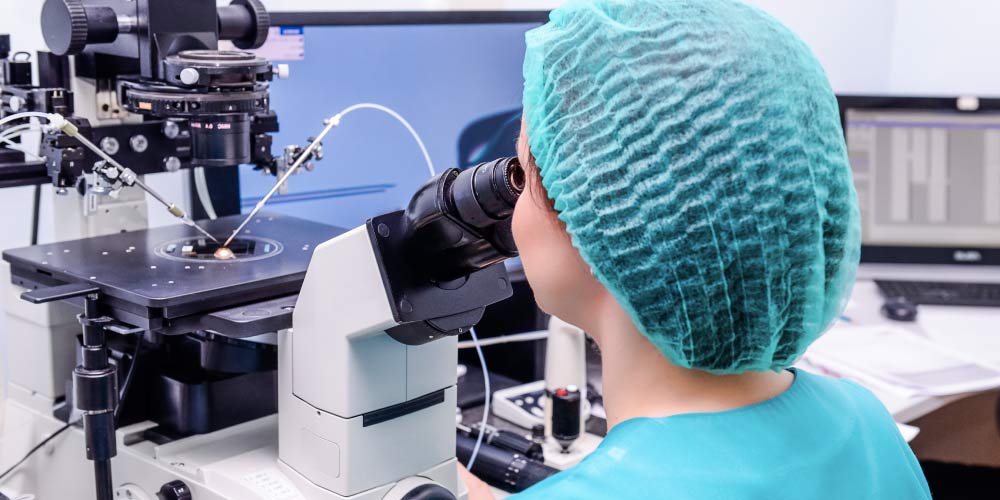![]() Views: 174
Views: 174
Genetic Testing for IVF – Preimplantation Genetic Testing
Read on to learn more about preimplantation genetic testing, commonly known as genetic testing, for IVF - how it’s done, why it’s important, and so on.
Dedicated Support at Every Step!
Our Doctors are available 24 hours a day, 7 days a week to help you!
In-vitro fertilization, or IVF, is a sought-after fertility treatment that has helped several couples and individuals experience parenthood. This treatment includes a combination of tests and procedures to ensure a successful outcome, i.e., a healthy pregnancy. Preimplantation genetic testing (PGT) is a crucial step in the IVF procedure that examines genetic defects in the embryo and ensures a healthy pregnancy. Read on to learn more about preimplantation genetic testing, commonly known as genetic testing, for IVF – how it’s done, why it’s important, and so on.
Table of Contents
All About Preimplantation Genetic Testing
As mentioned above, preimplantation genetic testing is a very important part of the IVF process that follows the fertilization stage and precedes the embryo transfer process. To ensure a healthy pregnancy and baby, fertility specialists have to first ensure that the embryo is free of any genetic defects. Why you may ask? Genetic problems in the embryo can cause various complications, including implantation failure, increased chances of miscarriage, and birth defects in the child. The defects may include single gene disorders, missing or extra chromosomes that may cause down syndrome, rearrangement of genes, and so on.
Therefore, once the embryo is formed, fertility specialists perform a PGT to look for genetic abnormalities in it. If the fertility specialists find genetic defects in the embryo during this test, they do not transfer them to the woman’s uterus.
No Cost EMI, Hassle-free Insurance Approval
Types Of Preimplantation Genetic Testing ( PGT-A, PGT-M, PGT-SR) At A Glance

There are three types of preimplantation genetic tests that are performed on the embryos.
PGT-A
PGT A test involves an analysis of embryo cells to check if there’s a normal amount of chromosomes present. The number of chromosomes can differ from too few to too many if there’s an unequal division of the sperm or egg cells. Most embryos have 46 chromosomes. They inherit 23 chromosomes from each patient. In case an embryo or a cell has an extra or missing chromosome, it is referred to as aneuploidy. A missing chromosome is called a monosomy, and an extra chromosome is called a trisomy.
Aneuploidy is considered a leading cause of failed implantation for pregnancy and miscarriage, as well as a major cause of birth defects in children.
PGT-M
PGT-M is performed to look for specific gene mutations that one (or both) of the parents is known to carry. Family background of genetic disorders in one or both parents generally increases the possibility of a child being born with a genetic mutation. A disorder that involves a single specific gene is caused because of a mutation in the DNA sequence. This can trigger conditions including cystic fibrosis and sickle cell anemia. It can also lead to an inherited genetic mutation, such as the BRCA1 and BRCA2 mutations, that may put a woman at risk of breast cancer and ovarian cancer.
During the PGT-M examination, the fertility specialist tests the embryos to rule out genetic disorders. The embryo is transferred only after genetic disorders are ruled out. The test examines common disorders such as Huntington’s Disease, Sickle Cell Anemia, Muscular Dystrophy, Cystic Fibrosis, BRCA1 & BRCA2 Mutations, Fragile-X Syndrome, and Tay-Sachs disease.
PGT-SR
PGT-SR test involves testing patients who are known to have chromosomal structural rearrangement. This may involve inversion or translocation. Patients with structural rearrangement are at an increased risk of producing embryos that do not have the right amount of chromosomal material. The affected embryos are less likely to result in a live birth. Patients with these issues often have repeated miscarriages. This test is used to examine Robertsonian translocations, Reciprocal translocations, and Non-reciprocal translocations.
What Happens In Preimplantation Genetic Testing?
The procedure of all three types of preimplantation genetic testing is more or less the same. The fertility specialists perform the IVF procedure in the standard way or based on the requirements of the specific case. Once fertilization happens and embryos are formed, they are kept in the laboratory for 5 to 6 days. By the fifth or sixth day, the embryo is called a blastocyst, i.e., a rapidly dividing ball of cells.
During the procedure, a few cells are taken from each embryo through a biopsy. They are then taken to the laboratory for PGT. The cells derived from a part of the blastocyst are referred to as the trophectoderm, which eventually forms the placenta. These cells are considered to be representative of the rest of the embryo. But you should note that this may only sometimes be the case due to circumstances such as mosaicism. The embryos need to be frozen while this test is performed. An embryo with normal PGT results is selected, thawed, and transferred to the uterus of the patient or their gestational carrier after a few days.
Who Are Good Candidates For PGT?

The good candidates for preimplantation genetic testing include the following:
- Women over age 37 (due to a higher risk of abnormal embryo genetics with normal reproductive aging)
- Women with a history of recurrent miscarriages due to chromosomal abnormalities
- Couples who are at risk of having a child with an inherited genetic disease
Are There Any Risks Of PGT?
In general, there are very few risks of PGT. Children born after PGT testing aren’t at any additional risk other than the normal health risks to mother and child in the IVF process. The procedure, however, requires precision. Handling the embryo, its biopsy, freezing, and thawing pose a small risk of damage that can cause a failure in embryo implantation. Usually, around 5% of embryos examined by PGT are lost due to this damage.
Another risk of PGT is inaccurate results, as the test is not 100% accurate. Due to this, it is recommended that the patient should go for typical prenatal testing when she is expecting.
Also Read: IVF Cost in India With Lowest Cost IVF Packages
The Bottom Line
All couples and individuals planning pregnancy through IVF want to leave no stone unturned in ensuring their child is born healthy and free of any congenital disorders. Preimplantation genetic testing is therefore considered an important step in the IVF process that helps ensure the embryos are healthy and do not have any genetic abnormalities.
If you have fertility issues and wish to get IVF, we suggest scheduling an appointment with Pristyn Care’s expert fertility specialists, who have 10+ years of experience in performing successful IVF procedures. Book your free consultation today.














